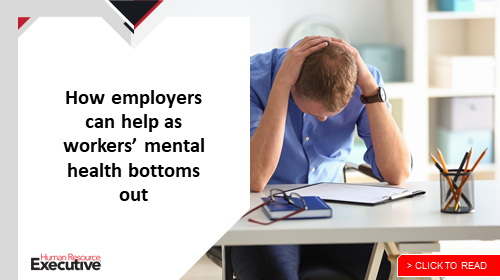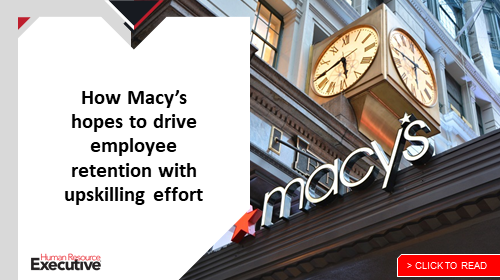12 stories to read ahead of HBLC
HRE’s annual Overall health & Advantages Leadership Convention is just a 7 days absent. The event—which will be held April 5-7 in Las Vegas—will take a look at some of the most pressing subject areas for HR and rewards leaders and dive deep into how the COVID-19 pandemic has influenced gains and HR procedures.
From common distant get the job done to new priorities on psychological overall health, family members-helpful advantages and perform/existence equilibrium, the very last two a long time have resulted in a huge transformation in the industry—and the conference will go over it all.
Want to capture up on some of the greatest added benefits tendencies in advance of the conference? Look at out these tales showcasing some of the HBLC speakers.
Certainly, distant can work—but it usually takes effort and hard work from business leaders: Above the past couple several years, distant function has come to be additional approved in the work world. But now in a COVID-19 era, it’s not just appropriate, it is believed to be a most well-liked design for several employees and businesses. Not only can remote make staff members extra successful, but it can cut down on lousy or taboo function behaviors (imagine: employees coming into the place of work ill or reheating fish in the communal microwave). While remote function is well-known, it just can’t be a set-it-and-overlook-it product of work, suggests Chris Dyer, founder and CEO of PeopleG2. It necessitates new means of administration, belief and determination from employers and HR and advantage leaders. Go through additional in this article.

The ‘most necessary worker advantage,’ according to economic guru Suze Orman: Longtime economic specialist, Emmy-award winning television host and author Suze Orman claims she was semi-retired when she acquired a pitch that encouraged her: an employer-sponsored emergency fund. It was an specially remarkable thought as Orman has been a proponent of unexpected emergency personal savings for years—and since she witnessed the financial toll COVID-19 took, wreaking havoc on employees’ monetary conditions. “[People] will not just just take dollars and set it in an emergency fund,” Orman suggests. “When it’s finished immediately for you by way of your paycheck and your employer matches it, now we’re talking. This is the most interesting, critical and desired worker reward that has ever been made available in the historical past of personnel strategies.” Read extra here.
 Mental health, dependancy go hand in hand—and COVID is making both equally even worse: For the earlier several years, mental wellness has been a escalating concentrate amongst corporations, a lot of of which see firsthand that their workers are struggling with burnout, anxiety, pressure and despair. But there’s an typically-forgotten element of the psychological well being equation: habit. And it is a dilemma that companies need to phase up on, states Cheryl Brown Merriwether, vice president and govt director of the Global Centre for Habit and Restoration Instruction. Study much more in this article.
Mental health, dependancy go hand in hand—and COVID is making both equally even worse: For the earlier several years, mental wellness has been a escalating concentrate amongst corporations, a lot of of which see firsthand that their workers are struggling with burnout, anxiety, pressure and despair. But there’s an typically-forgotten element of the psychological well being equation: habit. And it is a dilemma that companies need to phase up on, states Cheryl Brown Merriwether, vice president and govt director of the Global Centre for Habit and Restoration Instruction. Study much more in this article.
Major financial well being possibility? Focusing on limited-phrase assistance: Economically talking, factors have been bleak for a lot of staff members: Some stats exhibit as quite a few as 78% of workers are living paycheck to paycheck. Other research reveals that 40% of Americans never have $400 in the bank for unexpected emergency bills. And that was pre-pandemic. Now more than two yrs into COVID-19, the crisis and its continued uncertainty aren’t building factors a lot easier for employees’ economic wellness, says Timothy Flacke, executive director and co-founder at Commonwealth, a Boston-primarily based economical nonprofit. The silver lining is that there is a whole lot of innovation going on in the financial wellness market and there are rather straightforward strategies—many of which are mostly underutilized—that HR and advantages pros can embrace to assist staff. Study more right here.
Why well being fairness endeavours may be the next massive employer development: Employers have long prioritized a assortment of wellness and fiscal gains as a way to help their staff. But several professionals imagine there’s much a lot more that wants to be carried out to make certain staff have healthier, happy and monetarily secure life. Enter: wellbeing equity initiatives that address workers’ social determinants of wellbeing, which include healthcare entry and quality, financial steadiness, education obtain, and social and community elements. Even though business authorities have reviewed overall health equity in the latest a long time, not sufficient do the job has been carried out, says Seth Serxner, main overall health officer and senior vice president of inhabitants well being at Optum. Browse a lot more listed here.
5 of the most important rewards trends coming this calendar year: COVID-19 has significantly reshaped every single part of office society, such as employee gains. Because the start off of the pandemic, scores of sensible companies turned to new and increased positive aspects to aid employees via a myriad of worries. There has been a huge aim on actual physical health and safety, distant and flexible operating arrangements, mental overall health, COVID-19 vaccine approaches and incentives, and significantly far more. Now, as we enter the third 12 months of the pandemic—coupled with the Fantastic Resignation, which is spurring employers to get aggressive on retaining and attracting talent—what’s ahead for rewards approaches? The brief respond to: A ton, specialists say. Read extra here.
 Rewards technological innovation is having a moment—and COVID is partly liable: HR’s use of gains technology has been mounting around the past several several years, as providers focused not only on ways to notify workers of their choices and enhance the personnel encounter, but to save themselves time as well. But like many issues, COVID-19 fast accelerated the pattern. As employers dealt with a series of troubles even though trying to taking treatment of their employees—and swiftly receiving them supplemental support and resources—company and HR leaders extra aggressively turned to benefits and wellbeing tech methods to aid. “There’s an remarkable volume of emphasis on the area correct now,” states George LaRocque, founder and principal analyst at WorkTech. Read through more here.
Rewards technological innovation is having a moment—and COVID is partly liable: HR’s use of gains technology has been mounting around the past several several years, as providers focused not only on ways to notify workers of their choices and enhance the personnel encounter, but to save themselves time as well. But like many issues, COVID-19 fast accelerated the pattern. As employers dealt with a series of troubles even though trying to taking treatment of their employees—and swiftly receiving them supplemental support and resources—company and HR leaders extra aggressively turned to benefits and wellbeing tech methods to aid. “There’s an remarkable volume of emphasis on the area correct now,” states George LaRocque, founder and principal analyst at WorkTech. Read through more here.
What’s in advance for rewards coverage this 12 months? It’s under no circumstances a gradual time when it comes to overall health and advantages coverage. Issues are continuously in flux, which impacts HR and firm leaders and how they solution their personnel positive aspects procedures. And 2022 is no exception, with the yr marking midterm elections as effectively as the 3rd year of COVID-19—both of which will impact a amount of legislative concerns. So, what is at stake for HR and positive aspects leaders? As usual, there is a great deal, states Jim Klein, president of the American Gains Council, a Washington D.C.-centered employee positive aspects community policy firm. Read through extra below.
 From much better added benefits to higher pay, companies are upping the ante on expertise: Quite a few companies are rethinking their methods to aim on staff requirements while putting extra revenue in their wallets as they navigate a trifecta of concerns—COVID-19, the Great Resignation and document inflation. An increasing quantity of organization leaders recognize that if they really do not do so, they’ll check out expertise walk out the door. Browse much more here.
From much better added benefits to higher pay, companies are upping the ante on expertise: Quite a few companies are rethinking their methods to aim on staff requirements while putting extra revenue in their wallets as they navigate a trifecta of concerns—COVID-19, the Great Resignation and document inflation. An increasing quantity of organization leaders recognize that if they really do not do so, they’ll check out expertise walk out the door. Browse much more here.
1st step in locating a economic alternative for staff? Question what they require: COVID-19 undoubtedly has been monetarily devastating for many staff. But there is a vivid facet to how the pandemic has changed issues, fiscally speaking: It’s specified new urgency—and meaning—to how companies handle economical wellbeing for their personnel, claims Matt Bahl, vice president and head of place of work fiscal wellness at the Financial Well being Community. Read through additional here.
Experience HR burnout? 4 guidelines for self-treatment from HR leaders: The ongoing pandemic is driving premiums of burnout, despair, nervousness and anxiety like by no means in advance of. The most current investigate facts from Complete Brain’s Mental Wellness Index, for instance, reveals that mental overall health has hit an all-time low, fueled by the recent Omicron surge. And while staff members all in excess of are dealing with a assortment of psychological health issues, a particular team of staff members are not immune to the issues both: HR professionals. So, how are HR leaders using care of their individual psychological overall health and prioritizing self-treatment as they try out to help their staff members with theirs? HRE requested quite a few HR leaders here’s what they stated in their individual phrases. Examine far more here.
How employers can help as workers’ psychological health bottoms out: Amid all-time lows in psychological health, businesses are obtaining a new mandate to stage up initiatives to support having difficulties workforce. In addition to tried-and-legitimate benchmarks, like personnel support programs, many enterprise leaders are knowing they have to have to go further more as they see scores of workforce battle. Some businesses are enhancing added benefits and embracing shorter function weeks, adaptable schedules, money health and fitness attempts and mental wellbeing days. Read through extra here.





